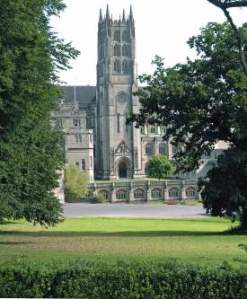On the Night Office this morning, the Abbot, read the Gospel of the Solemnity of Christ the King, the words resounded, "Jesus answered, "My kingdom does not belong to this world." (John 18 33b-37).
Later, we will listen to the Homily of the Mass by Fr. Raymond.
. . .
---- Forwarded Message -----
From: Raymond . . .
Sent: Sunday, 25 November 2012, 10:10
Subject: Kingship of Christ
From: Raymond . . .
Sent: Sunday, 25 November 2012, 10:10
Subject: Kingship of Christ
Kingship of Christ
- Jesus is for us, principally, the Son of God incarnate. But Scripture and tradition give us three other great titles for him: we call him PRIEST and we call him PROPHET and we call him KING.......Priest, Prophet and King.
- Two of these titles are specifically religious: Priest and Prophet.
- The Priest offers to God, on behalf of his fellow men, their prayers and their sacrifices.
- The Prophet offers to men the word that comes to them from God.
- But the third title is, in itself, a purely human term. It prescinds from religion altogether. A man is a king among his people even if neither he nor his people believe in God.
- So, to understand best what is meant by the Kingship of Christ we have first to forget, for a moment, the fact that he is God. Indeed, we might say that, of itself, his Divinity makes it impossible for us to consider him as merely our King.
- When Jesus said to Pilate: “Yes indeed I am a King, but my Kingdom is not of this world”, he had to say that because it was the only description of his Kingdom that would allay Pilate’s fears of political trouble. But for us, the Kingdom of Christ is indeed also very much “of this world”. Because it is not as God that he is our King. God is “God” and can never be a mere “King” except by a figure of speech. It is only by his incarnation that Christ is really our King. It is only because he is one of us and we are his brothers and sisters that he can live among us and truly call himself our King.
- In the Old Testament times there was something prophetic in Israel’s plea for a king from among themselves to lead them like other nations. Yet God wasn’t pleased by it although they didn’t mean to reject him as their God. It was just that they wanted a visible tangible King on earth. They were not to realise yet that the Messiah to come would be at once their God and their visible tangible King on earth.

Feast of Christ the King painting - By his incarnation, by his stepping down into his creation, Christ is not only king of his people he is King of the whole universe, King of all creation, men and angels. All were created through and by him and FOR him.













.jpg)






